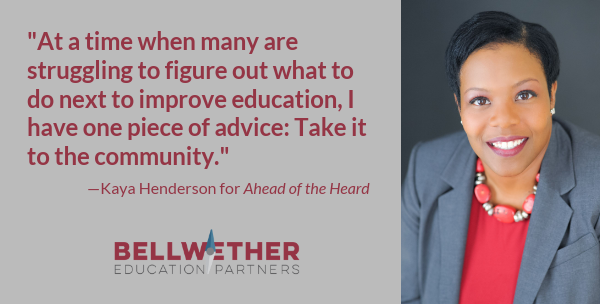Across the span of three decades, several large, urban districts, including those profiled on our site EightCities.org, pursued reform strategies centered on autonomy, accountability, and family choice. In recent years, some of these districts rolled back their signature reforms or shifted their focus due to leadership change or backlash. Other districts are building off of past models to develop new district improvement strategies. And now, all of these districts are grappling with the challenge of serving students and families during a global pandemic.
The school systems profiled at EightCities.org all have different contexts, successes, and challenges, which we captured in our original 2018 site — now updated for 2020. To mark the site’s relaunch, we reached out to five prominent education leaders and asked each of them:
- What is the outlook for innovative, ambitious district-wide reform strategies in 2020 and beyond?
- What are the biggest lessons state and local leaders should learn from the districts now facing headwinds in pursuit of these strategies?
- What should education leaders do to advance reforms in partnership with families and community stakeholders?
Their responses range from calls for activism, to community and employer engagement, to renewed focus on curriculum and instruction. While the advice is varied, it’s clear that no education reform strategy is ever finished — it must adapt to build on successes and address new challenges.
Howard Fuller
Former Professor, Marquette University; Former Superintendent, Milwaukee Public Schools
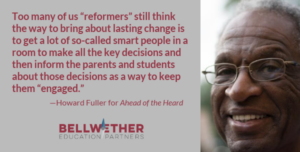 The search for the “new best practice” or the critical “proof point” continues in the struggle for education reform in the United States. New theories and reworked old theories about what must be done abound. In fact, many “reformers” no longer want to use the term “education reform” to characterize their efforts. Some of us continue to make the mistake of committing to new institutional practices as opposed to being committed to the needs and interests of our children. This commitment to method as opposed to purpose has put many “reformers” on the road to becoming the new status quo.
The search for the “new best practice” or the critical “proof point” continues in the struggle for education reform in the United States. New theories and reworked old theories about what must be done abound. In fact, many “reformers” no longer want to use the term “education reform” to characterize their efforts. Some of us continue to make the mistake of committing to new institutional practices as opposed to being committed to the needs and interests of our children. This commitment to method as opposed to purpose has put many “reformers” on the road to becoming the new status quo.
One thing that is sorely needed to have any hope of breaking this pattern is to incorporate the ideas and suggestions of the people being affected into the process prior to the real decisions being made. We must take seriously the notion of giving “power to the people.” Too many of us “reformers” still think the way to bring about lasting change is to get a lot of so-called smart people in a room to make all the key decisions and then inform the parents and students about those decisions as a way to keep them “engaged.”
However, one burning question remains: What are we to do now about the education — or more accurately the lack of education — of so many of our nation’s children, particularly Black and Brown children who are also poor?
Indeed, what should we be doing? My forty years of struggling to improve education for those children has convinced me that I will never see the changes that need to be made. The reality is the political system writ large does not give a damn about the plight of poor Black and Brown children. Lip service is given of course, but real change remains a distant possibility.
The injustices our kids face require bold activism. Institutions won’t change unless they are confronted directly by the need to change, and that requires courage among our leaders and our advocates to show up and stand up in the face of entrenched interests that limit us to tinkering around the edges of the status quo.
So I keep it moving not because I believe there will be the level of systemic change happening that the kids I care about need. I do it because of the possibility that my work will change the trajectory of one child’s life. I do it because we will never know what changing that one child’s life will mean to them and to the world. I do it because I know what is happening to them is unjust, and if I don’t get up each day and fight for them, then I am co-signing that injustice.
Kaya Henderson
CEO, Reconstruction US; former Chancellor of DC Public Schools
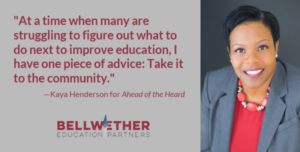 At a time when many are struggling to figure out what to do next to improve education, I have one piece of advice: Take it to the community. Far too often, we rely on the expertise that educators and policy makers bring to the table without recognizing the tremendous expertise that students, families, and community members have. Just because they haven’t had the power, agency or access that they deserve, doesn’t mean they don’t know what to do to improve education and how to do it. In fact, I’ve come to learn that the people closest to the problem often have the best solutions.
At a time when many are struggling to figure out what to do next to improve education, I have one piece of advice: Take it to the community. Far too often, we rely on the expertise that educators and policy makers bring to the table without recognizing the tremendous expertise that students, families, and community members have. Just because they haven’t had the power, agency or access that they deserve, doesn’t mean they don’t know what to do to improve education and how to do it. In fact, I’ve come to learn that the people closest to the problem often have the best solutions.
During my time leading DC Public Schools, I found that my stakeholders were experts at identifying key problems, generating innovative strategies to resolve problems, supporting effective execution, and sustaining reforms throughout leadership transitions. We did much of our best work in partnership with our community members. But that took working in ways that education organizations don’t usually work.
First, we had to build deep relationships with our students and families. We spent time with them, listening, learning, sharing, apologizing for times when we’d let them down, and being honest. That took time and was sometimes messy, but we did it. We allowed their hopes and dreams for their students to drive our agenda. We asked them to co-create solutions with us on big issues: how to consolidate schools, how to redraw school boundaries, what a new curriculum should contain, and what should be included in school budgets. We invited them to struggle with us over the hard-trade offs, and we shared credit for the wins. And every time we truly partnered (notice I did not use the word “engage”) with our community members, we got better ideas, better outcomes, and more sustainable and effective reforms.
So if you want to see the kind of tremendous progress for your students that we made in DCPS over the last decade, do yourself a favor, and take it to the community!
Patrick Dobard
Former Superintendent, Louisiana Recovery School District; CEO, New Schools for New Orleans
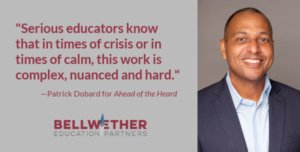 For the past 15 years, many leaders nationwide have embraced all or some of the core elements that allowed New Orleans to make dramatic academic improvements in the years after Hurricane Katrina. These elements included authorizing high-quality charter schools and allowing school autonomy in exchange for strong accountability. Our district was also strengthened by an influx of talent at all levels and a flexible policy structure that focused more on supporting schools and ensuring equity while mitigating traditional bureaucratic structures that bogged down learning and student growth. Together, these factors helped our system address serious challenges and supported children as they achieved striking academic growth. They have also allowed us to respond swiftly and effectively to the effects of the devastating onset of COVID-19 in our community. Our schools mobilized to provide students with the strongest possible education even when buildings were closed.
For the past 15 years, many leaders nationwide have embraced all or some of the core elements that allowed New Orleans to make dramatic academic improvements in the years after Hurricane Katrina. These elements included authorizing high-quality charter schools and allowing school autonomy in exchange for strong accountability. Our district was also strengthened by an influx of talent at all levels and a flexible policy structure that focused more on supporting schools and ensuring equity while mitigating traditional bureaucratic structures that bogged down learning and student growth. Together, these factors helped our system address serious challenges and supported children as they achieved striking academic growth. They have also allowed us to respond swiftly and effectively to the effects of the devastating onset of COVID-19 in our community. Our schools mobilized to provide students with the strongest possible education even when buildings were closed.
Serious educators know that in times of crisis or in times of calm, this work is complex, nuanced and hard. New Orleans schools are public, non-profit charter schools, and they are not immune to the realities of other urban districts in America in which most students are people of color from low-income backgrounds who have been systematically denied opportunity for so long. We are one of the more complex systems in the nation, because we are trying to solve traditional district challenges while preserving autonomy.
Going forward, we must recruit and retain great teachers to lead our classrooms. We must also more equitably allocate resources to support student learning and development. Finally, we must support authentic engagement and dialogue between communities and their systems of schools. This is all the more critical given the challenges of COVID-19, but New Orleans is well-positioned to take on the challenge. As we prepare for a school year rife with uncertainty, our unique structure allows schools to individualize plans within a shared framework to keep children, school teams, and families safe.
Mike Magee
CEO, Chiefs for Change
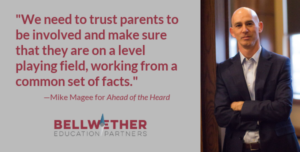 Prior to the beginning of the pandemic, we at Chiefs for Change were seeing ambitious and innovative district-wide strategies in the field, particularly around the adoption of high-quality materials and aligned teacher preparation. That work continues, and is among the four major recommendations in our recent report “The Return.” The successful implementation of these strategies at scale will have a positive effect on millions of children. And if we’ve learned anything from education reform’s past efforts, it’s that these types of ambitious plans need to be executed in partnership with teachers and families.
Prior to the beginning of the pandemic, we at Chiefs for Change were seeing ambitious and innovative district-wide strategies in the field, particularly around the adoption of high-quality materials and aligned teacher preparation. That work continues, and is among the four major recommendations in our recent report “The Return.” The successful implementation of these strategies at scale will have a positive effect on millions of children. And if we’ve learned anything from education reform’s past efforts, it’s that these types of ambitious plans need to be executed in partnership with teachers and families.
The state of Louisiana and Baltimore City Public Schools serve as exemplars for their approach to adopting high-quality curricula. When these system leaders launched audits of their curriculum systems, they leveraged real and concrete information about the content students were engaging with day to day to have conversations with teachers, but also families and other stakeholders. By engaging in authentic discussions and presenting accurate information that came from teachers, students, and families, they avoided falling prey to the endless abstractions of general curricular choices. Instead, empowered with accurate information gathered with the community, they grappled with real issues like what students should learn, how to ensure cultural relevance, and requiring meaningful — not just appropriate — levels of rigor.
The work also highlights the need to create transparent and accessible systems that support parents to be strong advocates for their children. We need to trust parents to be involved and make sure that they are on a level playing field, working from a common set of facts. For example, we cannot expect parents to have a voice in a conversation about the relevancy and value of curriculum choices if they do not have information about quality, cost, and — in the current context — usability in both classroom and home environments. And we cannot do that without providing families accurate information, from policies to budgets, about what is happening in the district and in classrooms.
Paul Hill
Founder, Center on Reinventing Public Education; Research Professor, University of Washington – Bothell
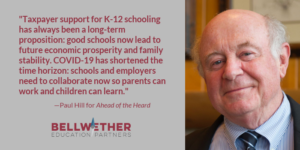 Before COVID, schools and employers had a nice symbiosis. Employers expected parents to be on the job at a normal time in the morning and be unencumbered by child care duties most of the day. This is now in doubt as schools struggle to educate children in smaller groups together for shorter times.
Before COVID, schools and employers had a nice symbiosis. Employers expected parents to be on the job at a normal time in the morning and be unencumbered by child care duties most of the day. This is now in doubt as schools struggle to educate children in smaller groups together for shorter times.
Employers will have urgent questions: Can schools commit to consistent schedules so parents can be reliably present on the job? When children go to school, can they stay there long enough to ensure parents several hours of work? Will online courses be organized so that teachers are in contact with students in real time, minimizing burdens on parents? Can school leaders limit how much engagement is expected of parents each day?
District leaders probably won’t welcome such questions, but if they leave employers in the dark, parents and children will be put under additional stress. Mayors might play roles in bringing the parties together.
Alternative arrangements — possibly foundation-funded study facilities with Internet, partitions for social distancing, snacks, exercise breaks, and one-on-one tutoring — could arise. These could help children learn without a teacher or parent present.
Taxpayer support for K-12 schooling has always been a long-term proposition: good schools now lead to future economic prosperity and family stability. COVID-19 has shortened the time horizon: schools and employers need to collaborate now so parents can work and children can learn.
This post is part of our Eight Cities project. Visit the Eight Cities website here and read all related posts here.
